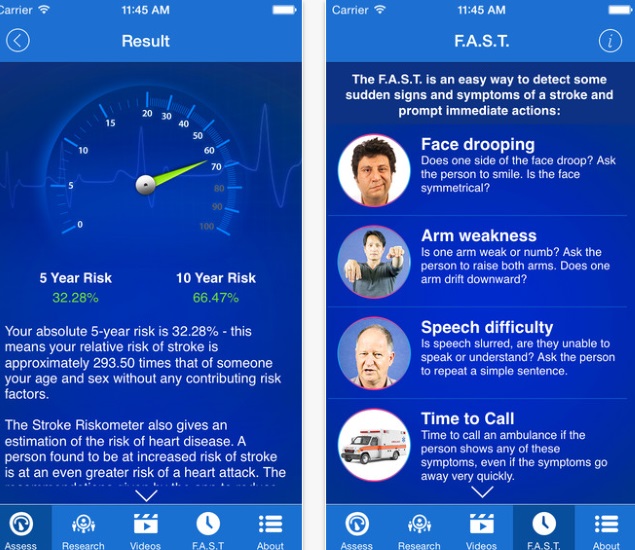- Home
- Science
- Science News
- Smartphone Study Aims to Help Save Lives From Non Communicable Illnesses
Smartphone Study Aims to Help Save Lives From Non-Communicable Illnesses

A neuroscience team from Auckland's AUT University said they aimed to gather vast amounts of international data and vital epidemiological insights through a mobile app called Stroke Riskometer.
Findings from the study - "Reducing the International Burden of Stroke Using Mobile Technology" (RIBURST) - could significantly reduce the devastating impact of conditions such as stroke, diabetes, dementia and heart disease.
"This study has the potential to save countless lives and billions of dollars worldwide," Xinhua news agency quoted programme leader Valery Feigin as saying in a statement on Friday.
"By delivering population-specific predictive algorithms plus preventative strategies tailored to different cultural and ethnic groups, we hope to dramatically reduce the burden these diseases place on people, families and health systems around the world."
The Stroke Riskometer app, which enabled users to assess their individual stroke risk on a smartphone or tablet, was launched in October 2013.
It had recently been updated in multiple languages, and allowed users to participate in the study from the comfort of their homes.
With an estimated 1.75 billion smartphone users around the world, the potential scale of the research was immense and could eclipse the largest medical experiment in history, a polio vaccine study in the 1950s that involved up to two million participants and led to near eradication of the disease.
"Non-communicable diseases account for 66 percent of deaths worldwide and cause serious disability for millions of people. Current primary prevention strategies are simply not effective enough," said Feigin.
The RIBURST data would enable the development of a predictive algorithm based on modern risk factors and allow for the generation of population-specific predictive algorithms.
"There's a huge need for more accurate prediction, more effective prevention, and culturally and ethnically unique preventative strategies," said Feigin.
"This study gives us a chance to achieve that."
Catch the latest from the Consumer Electronics Show on Gadgets 360, at our CES 2026 hub.
Related Stories
- Samsung Galaxy Unpacked 2025
- ChatGPT
- Redmi Note 14 Pro+
- iPhone 16
- Apple Vision Pro
- Oneplus 12
- OnePlus Nord CE 3 Lite 5G
- iPhone 13
- Xiaomi 14 Pro
- Oppo Find N3
- Tecno Spark Go (2023)
- Realme V30
- Best Phones Under 25000
- Samsung Galaxy S24 Series
- Cryptocurrency
- iQoo 12
- Samsung Galaxy S24 Ultra
- Giottus
- Samsung Galaxy Z Flip 5
- Apple 'Scary Fast'
- Housefull 5
- GoPro Hero 12 Black Review
- Invincible Season 2
- JioGlass
- HD Ready TV
- Laptop Under 50000
- Smartwatch Under 10000
- Latest Mobile Phones
- Compare Phones
- Tecno Spark Go 3
- iQOO Z11 Turbo
- OPPO A6c
- Samsung Galaxy A07 5G
- Vivo Y500i
- OnePlus Turbo 6V
- OnePlus Turbo 6
- Itel Zeno 20 Max
- Lenovo Yoga Slim 7x (2025)
- Lenovo Yoga Slim 7a
- Lenovo Idea Tab Plus
- Realme Pad 3
- Garmin Quatix 8 Pro
- NoiseFit Pro 6R
- Haier H5E Series
- Acerpure Nitro Z Series 100-inch QLED TV
- Asus ROG Ally
- Nintendo Switch Lite
- Haier 1.6 Ton 5 Star Inverter Split AC (HSU19G-MZAID5BN-INV)
- Haier 1.6 Ton 5 Star Inverter Split AC (HSU19G-MZAIM5BN-INV)

















